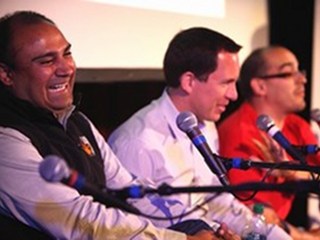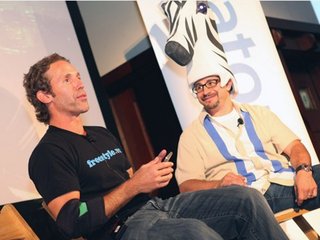What digital health trends are VCs embracing and ignoring?
VCs from Canvas Ventures, McKesson Ventures, Sequoia Capital, Xfund at Splash Health 2017
Read more...
During our third annual Vator Splash NY, we had a panel that featured Chris Fralic from First Round Capital, angel investor Deborah Jackson, Micah Rosenbloom from Founder Collective, Ben Lin from Great Oaks Capital Management, and Lewis Gersh from Metamorphic Ventures. Rick Heitzmann of FirstMark Capital moderated the panel, and he asked a really interesting question: What’s a company you can’t talk about without wincing because you wished you had invested in it? (I can’t imagine Rick’s one to talk, since he was one of the first investors in Pinterest, so, probably no regrets there, but whatevs.)
The investors on the panel had some interesting misses to talk about.
“General Assembly is one—those guys built a brand and put themselves in the middle of New York, and now everyone goes there,” said Chris Fralic. “You hear people say “I’m going to GA,” and you instantly know what they’re talking about.”
But there was also some cautionary language.
“We have what we call our ‘unportfolio,’ but it’s a hard question to answer. What you think you wish you should have been in right now might be tomorrow’s shit show,” said Lewis Gersh.
Deborah Jackson had a big miss…
“I wish I had invested in Twitter. I was skeptical when I first heard about it, but I’ve met so many people who have found their voice and amplified their voice on Twitter. We’ve seen on an international level that it can change countries.”
And then there was Micah Rosenbloom, who totally pinned the blame on his wife.
“I was pitched by two women from HBS who had an idea for selling beauty products online, and I went to my wife and told her about it and she said, ‘I would never sign up for something like that.’ So I ended up not investing in Birchbox.”
Ben Lin admitted to passing up a chance to invest in Airbnb, but he wasn’t the only one who was skeptical about it in its early days.
“When I heard about Airbnb, I thought it was the dumbest idea ever,” said Fralic. “I thought who would do that? And now here we are, we’ve invested in DogVacay, which is an Airbnb for dogs…” [Note: DogVacay won Vator Splash LA over the summer.]
Hindsight is 20/20 and all that jazz.
For the entrepreneurs out there, let this be a lesson to you: VCs can and do pass up really great ideas, so don’t lose heart.
Image source: maniacworld.com
VCs from Canvas Ventures, McKesson Ventures, Sequoia Capital, Xfund at Splash Health 2017
Read more...At Post Seed 2016, Founders and Partners discussed about Post Seed and Small A Round
Read more...At Post Seed 2016, CEOs and Partners talked about the size of their funds and investment
Read more...Startup/Business
Joined Vator on
Twitter is an online information network that allows anyone with an account to post 140 character messages, called tweets. It is free to sign up. Users then follow other accounts which they are interested in, and view the tweets of everyone they follow in their "timeline." Most Twitter accounts are public, where one does not need to approve a request to follow, or need to follow back. This makes Twitter a powerful "one to many" broadcast platform where individuals, companies or organizations can reach millions of followers with a single message. Twitter is accessible from Twitter.com, our mobile website, SMS, our mobile apps for iPhone, Android, Blackberry, our iPad application, or 3rd party clients built by outside developers using our API. Twitter accounts can also be private, where the owner must approve follower requests.
Twitter started as an internal project within the podcasting company Odeo. Jack Dorsey, and engineer, had long been interested in status updates. Jack developed the idea, along with Biz Stone, and the first prototype was built in two weeks in March 2006 and launched publicly in August of 2006. The service grew popular very quickly and it soon made sense for Twitter to move outside of Odea. In May 2007, Twitter Inc was founded.
Our engineering team works with a web application framework called Ruby on Rails. We all work on Apple computers except for testing purposes.
We built Twitter using Ruby on Rails because it allows us to work quickly and easily--our team likes to deploy features and changes multiple times per day. Rails provides skeleton code frameworks so we don't have to re-invent the wheel every time we want to add something simple like a sign in form or a picture upload feature.
There are a few ways that Twitter makes money. We have licensing deals in place with Google, Yahoo!, and Microsoft's Bing to give them access to the "firehose" - a stream of tweets so that they can more easily incorporate those tweets into their search results.
In Summer 2010, we launched our Promoted Tweets product. Promoted Tweets are a special kind of tweet which appear at the top of search results within Twitter.com, if a company has bid on that keyword. Unlike search results in search engines, Promoted Tweets are normal tweets from a business, so they are as interactive as any other tweet - you can @reply, favorite or retweet a Promoted Tweet.
At the same time, we launched Promoted Trends, where companies can place a trend (clearly marked Promoted) within Twitter's Trending Topics. These are especially effective for upcoming launches, like a movie or album release.
Lastly, we started a Twitter account called @earlybird where we partner with other companies to provide users with a special, short-term deal. For example, we partnered with Virgin America for a special day of fares on Virginamerica.com that were only accessible through the link in the @earlybird tweet.
What's next for Twitter?
We continue to focus on building a product that provides value for users.
We're building Twitter, Inc into a successful, revenue-generating company that attracts world-class talent with an inspiring culture and attitude towards doing business.
Startup/Business
Joined Vator on
Airbnb.com is the “Ebay of space.” The online marketplace allows anyone from private residents to commercial properties to rent out their extra space. The reputation-based site allows for user reviews, verification, and online transactions, for which Airbnb takes a commission. As of June, 2009, the San Francisco-based company has listings in over 1062 cities in 76 countries.
Startup/Business
Joined Vator on
DogVacay.com is a community marketplace that addresses the $5B market for dog-boarding and pet-sitting. Instead of paying for a crowded and overpriced kennel, our users book with experienced hosts who watch dogs in their own homes. In two months since launch the we have gained national coverage with thousands of approved hosts.
We provide multiple layers of quality control, a comprehensive insurance policy, emergency support, photo updates, and other pet services like daycare and walking.
We were founded in 2011 by a husband and wife team who boarded over 100 dogs in their home to make extra money while saving for their weddin. We are now venture capital funded by First Round Capital, Science, and several angels.

Joined Vator on

Joined Vator on
Ben is Managing Partner of Great Oaks Venture Capital and has been investing in startups at Great Oaks since 2006.
Joined Vator on
Micah is a serial entrepreneur, he is currently CEO of Novophage, and previously co-founded Brontes Technologies. and Handshake.com. Micah is also a Founder Partner to Founder Collective.
Joined Vator on
Lewis Gersh is a Managing Partner at Metamorphic Ventures which invests in seed and early stage digital media and digital commerce technology companies.
Joined Vator on

Joined Vator on
Founder and CEO- PlumAlley.co, Founder- Women Innovate Mobile Accelerator (WIM), Angel Investor, Investor in Golden Seeds Fund 2, prior Investment Banker 20+ years including health care internet


